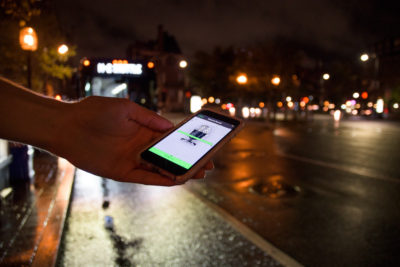
The streets of Boston are constantly filled with sound — people talking, cars honking, ambulances blaring — forming the general ambience of the city. On an ordinary day, Bostonians don’t pay attention to these sounds, but a new app seeks to bring the constant noise presence into the spotlight.
Harvard University graduate school student Erica Walker has created an app called NoiseScore, which regularly updates a map of sound and noise pollution around the world based on user-submitted information.
Walker, who recently graduated from Harvard T.H. Chan School of Public Health, began researching noise pollution in Boston through a survey in 2015-16. According to Walker, the original online survey received around 1,200 responses from approximately 400 sites.
After the survey was completed, Walker said she realized something was missing.
“I just knew that a static sort of map like that, that doesn’t change from minute to minute, day to day, wasn’t going to cut it. It has to be dynamic for it to reflect the situation. So I thought, what can I do to make this current?” Walker said. “I wanted to make something that had a real-time element, a well-rounded method of looking at noise complaints.”
The NoiseScore app allows users to log any noise they encounter and upload a record of it onto the online map. The map is updated every minute. Users can record sound level if they want, take a picture and/or video of the event, and answer a five question survey about their feelings on the sound.
The data collection measures on NoiseScore are meant to help distinguish sound from noise. In terms of the project, noise is harmful or irritating auditory input, whereas sound is innocuous or ordinary auditory input, Walker said.
According to the app’s website, the project was funded by the Radcliffe Institute for Advanced Study at Harvard, which provides support for collaborative research projects. Every two years, the Radcliffe Institute focuses on a theme, the past two years’ theme being citizenship, and leaders of the program felt that Walker’s project fit well, according to Sean O’Donnell, associate director of media ventures at the Radcliffe Institute.
“It’s a great way to approach urbanism and the problems and challenges of living in the city,” O’Donnell said. “This idea of ‘citizen science,’ using science to help residents; it empowers them to determine what kind of environment they want to live in.”
Walker, along with her collaborator and web designer Julio César Román, said they have big hopes for the project’s potential to help people.
“The really cool thing about it is that people can use it for advocacy, and take a closer look at the places they live in,” Román said. “For instance, if I want to move to a particular neighborhood, this data could help me find a place with a type or quality of sound that I like or don’t mind.”
Walker envisions students looking for a quiet place to study using the app, or businesses using it to narrow down their locations.
“It gives a better sense of how noise shapes our cities,” Walker said.
However, sound and noise can mean different things to different people. As an example, Roman said that people who are baseball fans might not mind the sound of a packed baseball stadium near their home. Both Walker and Roman said they see the app having the potential to aid people in making informed choices about where they live.
“It’s really important to have citizen-determined data that is publicly available. People do a lot of studies on this sort of thing, but it’s not always available to everyone,” Walker said. “This provides evidence for everybody.”
Walker said she hopes the app will foster conversation, not only around the problem of noise pollution, but around sound as a part of our lives.
“Noise and noise pollution are significant environmental stressors, but people don’t always take it seriously,” Walker said. “They don’t think of it like it’s a pressing issue, not in the face of things like climate change and air pollution. But it can really be problematic to your health.”
Walker described how on the original survey, participants in high noise pollution areas would sometime provide alarming answers to how they felt about their neighborhoods’ noise.
“They would say they felt like they couldn’t control it, couldn’t escape, that they felt hopeless, depressed and trapped,” Walker said. “If this were anything other than noise pollution, people would be sounding the alarm. But because there’s a stigma around noise pollution, that it’s not serious, people don’t think of it as a big deal.”
As a long-term dream, Walker said she hopes to increase overall societal awareness of noise pollution.
“I think of it like this: when I was younger, people didn’t recycle at all, but nowadays, everyone does. Is it possible to make dealing with noise pollution as second-nature as recycling?” Walker said. “I hope people use this research to think about noise as another dimension of their lives, and consider how it positively and negatively affects them.”


















































































































Jeremy dePrisco • Nov 10, 2017 at 12:28 pm
I think this is great, but relying on self-submitted audio will skew this too far to make it objective and really useful. Better to use microphones places strategically, or do a Google Street View type survey.
Jeanne Kempthorne • Oct 27, 2017 at 10:25 am
So glad to see Erica Walker’s work being publicized! It’s a crying shame that 40 years after Congress sounded the alarm about noise pollution, the public and our public officials are either unaware of the dangers of noise pollution or have thrown up their hands and given up on the idea that something can be done to improve the situation. I hope we are moving on a new path toward improving public health and civil life.